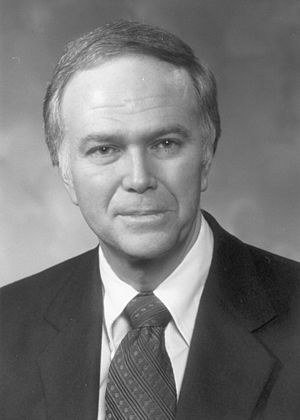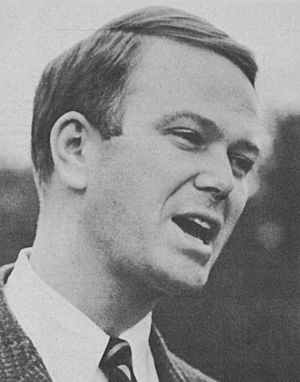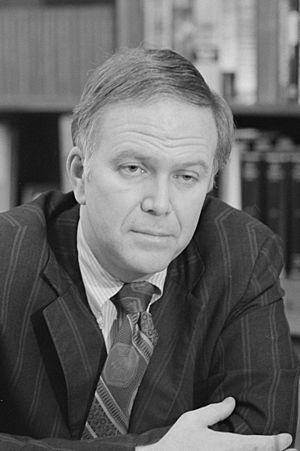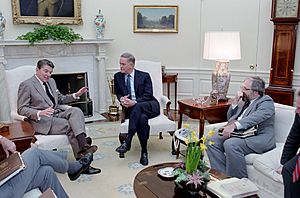Bob Packwood facts for kids
Quick facts for kids
Bob Packwood
|
|
|---|---|
 |
|
| Chair of the Senate Finance Committee | |
| In office January 3, 1995 – October 1, 1995 |
|
| Preceded by | Daniel Patrick Moynihan |
| Succeeded by | William Roth |
| In office January 3, 1985 – January 3, 1987 |
|
| Preceded by | Bob Dole |
| Succeeded by | Lloyd Bentsen |
| Chair of the Senate Commerce Committee | |
| In office January 3, 1981 – January 3, 1985 |
|
| Preceded by | Howard Cannon |
| Succeeded by | John Danforth |
| United States Senator from Oregon |
|
| In office January 3, 1969 – October 1, 1995 |
|
| Preceded by | Wayne Morse |
| Succeeded by | Ron Wyden |
| Member of the Oregon House of Representatives from the 6th district |
|
| In office January 14, 1963 – January 3, 1969 |
|
| Preceded by | Multi-member district |
| Succeeded by | Multi-member district |
| Personal details | |
| Born |
Robert William Packwood
September 11, 1932 Portland, Oregon, U.S. |
| Political party | Republican |
| Spouses |
Georgie Oberteuffer
(m. 1964; div. 1991)Elaine Franklin
(m. 1998) |
| Children | 2 |
| Education | Willamette University (BA) New York University (JD) |
Robert William Packwood (born September 11, 1932) is an American retired lawyer and politician from Oregon who served as a member of the United States Senate from 1969 to 1995. He resigned from the U.S. Senate under threat of expulsion, in 1995 after allegations of ..., ..., and assault of women emerged. He is a member of the Republican Party.
Since the death of Fred R. Harris in November 2024, Packwood is the earliest-serving living U.S. senator, and is the last living former U.S. senator who assumed office in the 1960s.
Contents
Early life and career
Packwood was born in Portland, Oregon, graduated from Grant High School in 1950, and in 1954 graduated from Willamette University in Salem.
Packwood is the great-grandson of William H. Packwood, the youngest member of the Oregon Constitutional Convention of 1857. Packwood had his great-grandfather's political bent from his early years. During his undergraduate years, he participated in Young Republican activities and worked on political campaigns, including later Governor and US Senator Mark Hatfield's first run for the Oregon House of Representatives. He received the Root-Tilden Scholarship to New York University's Law School, where he earned national awards in moot court competition and was elected student body president. After graduating from the NYU Law School in 1957, he was admitted to the bar and practiced law in Portland.
State legislative career
In 1960, he was elected Chairman of the Multnomah County, Oregon Republican Central Committee, thus becoming the youngest party chairman of a major metropolitan area in the country. In 1962, he became the youngest member of the Oregon Legislature when he was elected to the Oregon House of Representatives after a campaign waged by what The Oregonian called "one of the most effective working organizations in many an election moon in Oregon". Hundreds of volunteers went door-to-door, distributing leaflets throughout the district, and put up lawn signs that became "literally a geographical feature" of the district. Because of the effectiveness of his own campaigns, Packwood was selected to organize a political action committee that recruited attractive Republican candidates for the Oregon House throughout the state, and trained them in "Packwood-style" campaigning methods. The success of his candidates was credited with the Republican takeover of the Oregon House, thus making Oregon the only state in the Union in which the Republicans were able to score a significant victory in 1964.
Packwood was a member of the Oregon House of Representatives from 1963 to 1968. In 1965, he founded the Dorchester Conference in Seaside, Oregon, an annual political conclave on the Oregon coast that "pointedly ignored state leadership in the Grand Old Party" to bring Republican officeholders and citizens together, to discuss current issues and pass resolutions taking stands on those issues. Initially a forum for liberal politics, it has become an annual networking event for Oregon Republicans.
U.S. Senator
In 1968, Packwood was nominated to run for the U.S. Senate in Oregon as the Republican candidate against Democratic incumbent Wayne Morse. Morse had been elected to the Senate as a Republican in 1944 and 1950, then switched parties due to his liberal views, and was easily re-elected as a Democrat in 1956 and 1962. The relatively unknown Packwood was given little chance, but after an 11th-hour debate with the incumbent before the City Club of Portland, which Packwood was generally considered to have won, and a statewide recount in which over 100,000 ballots were challenged by both parties, Packwood was declared the winner by 3,500 votes. Packwood replaced U.S. Senate member Ted Kennedy of Massachusetts as the youngest senator. Packwood was re-elected in 1974, 1980, 1986, and 1992.
Packwood's voting record was moderate. He supported restrictions on gun owners and liberal civil rights legislation. Packwood voted in favor of the bill establishing Martin Luther King, Jr. Day as a federal holiday, and the Civil Rights Restoration Act of 1987 (as well as to override Ronald Reagan's veto).
Packwood differed with President Richard Nixon on some significant issues. He voted against Nixon's Supreme Court of the United States nominees Clement Haynsworth and G. Harrold Carswell, as well as Nixon's proposals for the Rockwell B-1 Lancer, submarines capable of carrying the Trident and the supersonic transport (SST). He became the first U.S. Senate Republican to support the Impeachment process against Richard Nixon, which was unsuccessful. In a White House meeting on November 15, 1973, he told Nixon that the public no longer believed him, and no longer trusted the integrity of the administration.
..... In 1987, Packwood crossed party lines to vote against the nomination of Robert Bork to the Supreme Court, and he was one of only two Republicans to vote against the Clarence Thomas Supreme Court nomination to the Supreme Court of the United States in 1991. .....
He played a major role in the enactment of the Hells Canyon National Recreation Area Act, sponsoring a bill which protected scenic Hells Canyon, the deepest river gorge in North America, by making it into a 652,488-acre (2,640.53 km2) National Recreation Area on the borders of northeastern Oregon and western Idaho. Environmentalists also praised his advocacy of solar energy, returnable bottles, and bike paths.
Deregulation was another interest of Packwood's. In the late 1970s, he became a passionate supporter of trucking deregulation, and a "persuasive spokesman" for reform.
He has been described as an "ardent" pro-Israel supporter. He opposed a sale of F-15s to Saudi Arabia under President Reagan.
He was most noted for his role in the 1986 tax reform, while he was chairman of the Senate Finance Committee. President Ronald Reagan had proposed the idea of tax reform in 1984, but Packwood's initial response was indifferent. However, he played a leading role in fashioning a tax code that would raise business taxes by some $120 billion over five years, and lower personal income taxes by roughly the same amount.
Packwood's debating skills were rated A+ by USA Today in the issue of July 18, 1986. But his debating and legislative skills could kill bills as well as pass them. His floor management has been credited with killing President Clinton's 1993 health care bill. And he could be stubborn; in 1988, he was carried feet-first into the Senate Chamber by Capitol Police for a quorum call on campaign finance reform legislation.
Resignation
Expulsion recommendation and resignation
Despite pressure for open hearings from the public and from female Senators, especially Barbara Boxer from California, the Senate ultimately decided against them. The Ethics Committee's indictment, running to ten volumes and 10,145 pages, much of it from Packwood's own writings, according to a report in The New York Times, detailed the ..., obstruction of justice, and ethics charges being made against him. ..... On September 7, the committee unanimously recommended that Packwood be expelled from the Senate.
The following morning, the committee released its findings. With bipartisan pressure mounting, Packwood announced his resignation from the Senate, saying that he was "aware of the dishonor that has befallen me in the last three years" and his "duty to resign." Democratic Representative Ron Wyden won the seat in a special election.
.....
Four years later, during debate on President Clinton's impeachment, McConnell said that the Republicans knew that it was very likely Packwood's seat would fall to the Democrats if Packwood were forced out. However, McConnell said, he and his fellow Republicans felt that it came down to a choice of "retain the Senate seat or retain our honor."
After the U.S. Senate
Soon after leaving the Senate, Packwood founded the lobbying firm Sunrise Research Corporation. The former senator used his expertise in taxes and trade, and his status as a former Senate Finance Committee chairman, to land lucrative contracts with numerous clients, among them being Freightliner Trucks, Marriott International, and the now-defunct Northwest Airlines. Among other projects, he played a key role in the 2001 fight to repeal the estate tax in the United States. In 2015, Packwood returned to the Senate as a witness for the United States Senate Committee on Finance, which was again considering tax reform. He and U.S. Senate member Bill Bradley of New Jersey spoke on the Tax Reform Act of 1986.
See also
- List of United States senators expelled or censured
- List of American federal politicians convicted of crimes
- List of federal political scandals in the United States
 | Misty Copeland |
 | Raven Wilkinson |
 | Debra Austin |
 | Aesha Ash |




